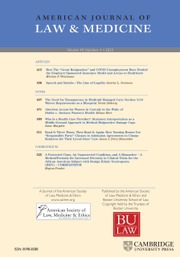Article contents
The Saikewicz Decision: A Medical Viewpoint
Published online by Cambridge University Press: 29 April 2021
Abstract
In this Article, Dr. Arnold S. Relman, the Editor of The New England Journal of Medicine, takes issue with the 1977 Saikewicz decision of the Massachusetts Supreme Judicial Court, which addressed the question of whether chemotherapy should be provided to a severely retarded 67-year-old man who had developed acute leukemia. Dr. Relman interprets Saikewicz as requiring that medical treatment decisions involving the life or death of incompetent patients must receive judicial resolution instead of resolution by the patient's family and physicians. This rule, he asserts, violates medical tradition, and its application will result in serious problems, such as the unnecessary prolongation of the suffering of many seriously ill persons. Dr. Relman proposes, as an alternative to the Saikewicz approach, that in such cases judicial resolution should occur only when there is disagreement, concerning treatment, among next of kin, or between next of kin and attending physicians, or when there is a complaint of injury or of wrongdoing. In all other situations, resolution solely by next of kin and attending physicians should be sufficient. Adequate protection of the interests of the incompetent patient could be achieved by a requirement that the physician in charge document in the medical record that the treatment decision received the concurrence of the family and advance approval of a group of the physician's professional colleagues who have no vested interest in the outcome of the decision.
- Type
- Article
- Information
- Copyright
- Copyright © American Society of Law, Medicine and Ethics and Boston University 1978
References
1 Superintendent of Belchertown State School v. Saikewicz, 1977 Mass. Adv. Sh. 2461, 370 N.E.2d 417 (1977).
2 In re Quinlan, 70 N.J. 10, 355 A.2d 647 (1976).
3 Ad Hoc Committee of the Harvard Medical School to Examine the Definition of Brain Death, A Definition of Irreversible Coma, 205 J.A.M.A. 337 (1968)CrossRefGoogle Scholar.
4 Curran, The Saikewicz Decision, 298 New England J. Med. 499 (1978)CrossRefGoogle Scholar; Relman, The Saikewicz Decision: Judges as Physicians, 298 New England J. Med. 508 (1978)CrossRefGoogle Scholar.
5 Annas, After Saikewicz: No-Fault Death, Hastings Center Rep., June 1978, at 16.
6 Baron, Assuring “Detached But Passionate Investigation and Decision“: The Role of Guardians Ad Litem in Saikewicz-Type Cases, 4 Am. J. L. & Med. 111 (1978)CrossRefGoogle Scholar.
7 In re Dinnerstein, 1978 Mass. App. Adv. Sh. 736.
8 Schram, KaneJr., Jr.,, & Roble, ‘No Code” Orders: Clarification in the Aftermath of Saikewicz, 299 New England J. Med. 875 (1978)CrossRefGoogle Scholar.
9 Baron, supra note 6, at 112.
10 Duff, & Campbell, Moral and Ethical Dilemmas in the Special-Care Nursery, 289 New England J. Med. 890 (1973)CrossRefGoogle Scholar.
11 Shaw, Randolph, & Manard, Ethical Issues in Pediatric Surgery: A National Survey of Pediatricians and Pediatric Surgeons, 60 Pediatrics 588 (1977)Google Scholar.
12 Supra note 10.
13 Robertson, & Fost, Passive Euthanasia of Defective Newborn Infants: Legal Considerations, 88 J. Pediatrics 883 (1976)CrossRefGoogle Scholar.
- 26
- Cited by


